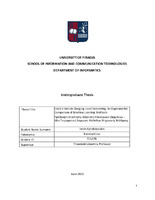| dc.contributor.advisor | Theodoridis, Ioannis | |
| dc.contributor.advisor | Θεοδωρίδης, Ιωάννης | |
| dc.contributor.author | Kyriakopoulos, Iason | |
| dc.contributor.author | Κυριακόπουλος, Ιάσων | |
| dc.date.accessioned | 2025-07-28T06:34:07Z | |
| dc.date.available | 2025-07-28T06:34:07Z | |
| dc.date.issued | 2025-06 | |
| dc.identifier.uri | https://dione.lib.unipi.gr/xmlui/handle/unipi/18026 | |
| dc.format.extent | 35 | el |
| dc.language.iso | en | el |
| dc.publisher | Πανεπιστήμιο Πειραιώς | el |
| dc.rights | Αναφορά Δημιουργού-Μη Εμπορική Χρήση-Όχι Παράγωγα Έργα 3.0 Ελλάδα | * |
| dc.rights | Αναφορά Δημιουργού-Μη Εμπορική Χρήση-Όχι Παράγωγα Έργα 3.0 Ελλάδα | * |
| dc.rights.uri | http://creativecommons.org/licenses/by-nc-nd/3.0/gr/ | * |
| dc.title | Electric vehicle charging load forecasting : an experimental comparison of machine learning methods | el |
| dc.title.alternative | Πρόβλεψη απαίτησης φόρτισης ηλεκτρικών οχημάτων – Μία πειραματική σύγκριση μεθόδων μηχανικής μάθησης | el |
| dc.type | Bachelor Dissertation | el |
| dc.contributor.department | Σχολή Τεχνολογιών Πληροφορικής και Επικοινωνιών. Τμήμα Πληροφορικής | el |
| dc.description.abstractEN | With the growing popularity of electric vehicles, as a means of addressing climate change, there are
concerns about their adoption affecting electric grid management. Consequently, predicting charging
demand is a timely and valuable research effort. There has been plenty of research on the forecasting of
energy load in transportation. However, there are limited efforts to compare multiple methods over different
temporal and spatial horizons, across a variety of cities.
This thesis investigates the effectiveness of five time series forecasting models, ranging from traditional
statistical ones to more recent machine learning and deep learning methods. The predictions cover short-,
mid- and long-term forecasting scenarios, examining performance from individual charging station level
through regional aggregations to city scale implementations.
All models were implemented in lightweight form, with no hyperparameter tuning, limited epochs and
simple, pre-defined architectures. According to the results, ARIMA outperforms the other, more complex
models across all configurations. Despite its simplicity, it achieves the lowest prediction errors, highlighting
its robustness and timelessness. | el |
| dc.subject.keyword | Electric vehicles | el |
| dc.subject.keyword | Charging load forecasting | el |
| dc.subject.keyword | Time series forecasting | el |
| dc.subject.keyword | Comparative analysis | el |
| dc.subject.keyword | ARIMA | el |
| dc.subject.keyword | Machine learning | el |
| dc.subject.keyword | Deep learning | el |
| dc.date.defense | 2025-06-20 | |



